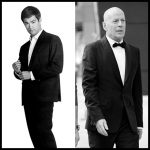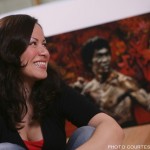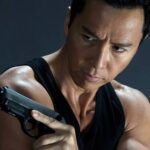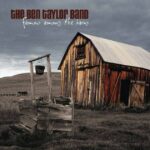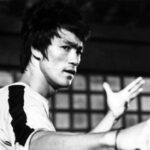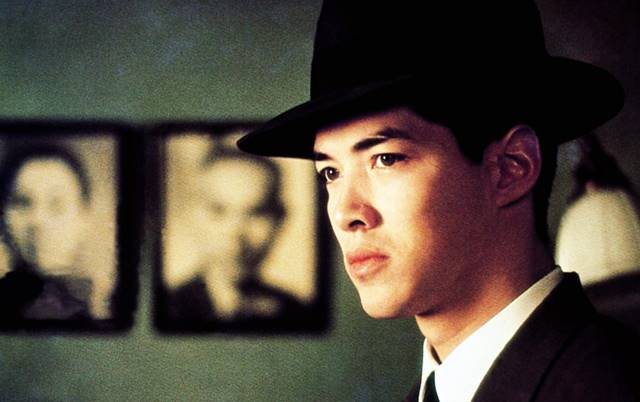
By Jae-Ha Kim
Chicago Sun-Times
February 18, 1996
Jackie Chan isn’t the only Asian actor ready for the big screen. After decades of being relegated to roles playing houseboys or, worse yet, losing roles to Caucasian actors made up to look Oriental, actors of Asian descent finally are getting their time on the big and little screens in America. Heck. Even the all-American hero, Superman, is played — on TV — by Dean Cain, who is part Japanese.
While Hollywood has been fairly receptive to Asian actresses (Joan Chen, Gong Li, Lauren Tom, Ming-Na Wen and Tamlyn Tomita), the same can’t be said for Asian men, who have generally been portrayed as four-eyed eunuchs (see any of Gedde Watanabe’s films).
“Throughout film history, there really haven’t been that many key Asian leading men,” said Bill Gee, executive director of the New York-based Asian Cinevision. “There was James Shigeta in the ’50s and ’60s and Bruce Lee in the ’70s, and we really haven’t had that many others. But a few years ago, a crop of young actors came into prominence around the same time – (the late) Brandon Lee, Russell Wong, Jason Scott Lee, Keanu Reeves. (Reeves is) part Hawaiian and Chinese, although he is more Caucasian than Asian and has more Western features. I don’t think it’s a coincidence that some of these actors have made it onto the big screen as leading men because they don’t have the strictly Asian characteristics.”
It doesn’t always work that way, though.
“People couldn’t tell by my name that I was Asian,” said Patrick Bishop, a half Japanese and half Caucasian actor who had a recurring role on “General Hospital.” “Sometimes I would get called in for auditions, and the casting director would look really surprised when I showed up and say, `Oh, the role’s not for an Asian.’ Like I could only play roles that were specifically written for Asians.”
Ironically, there was a time when Asians were also exclusively portrayed on the screen by whites. Peter Ustinov, Warner Oland and Sidney Toler all portrayed Charlie Chan. And while Bruce Lee may have conceived “Kung Fu” as a starring vehicle for himself, the producers decided he was “too Asian looking” and picked David Carradine to star as the Shaolin priest on the run. And controversy clouded “Miss Saigon” when it was announced that the English actor Jonathon Pryce landed the plum role of a Eurasian character.
“Things don’t change overnight,” Gee said. “And there are more Asians going into acting now than ever before. Our society is more multicultural, too, and this will eventually be reflected in films. I think there are more opportunities for Asians to make an impact in film now than ever. I hope it’s more than a trend.”
With 1973’s “Enter the Dragon,” martial arts expert Bruce Lee became America’s premier Asian movie star. Since then, a slew of actors of Asian descent have been trying to break into the elusive leading-man clique. For a while, it looked like Lee’s son Brandon would gain admission. His lead role in 1993’s “The Crow” was a star-making vehicle, but he died in a freak accident during the shoot.
Here are four young actors who’ve been wowing critics and moviegoers:
Jason Scott Lee. After impressing critics with his portrayal of Bruce Lee in 1993’s “Dragon: The Bruce Lee Story,” Lee (no relation) went on to make “Map of the Human Heart” and “Jungle Book.” The well-muscled Hawaiian actor is poised for stardom and will appear in “The Green Hornet” next year. Ironically, Lee will play the Green Hornet’s sidekick, Kato, whom Bruce Lee portrayed in the TV series. Movie buffs will recall that that series was based on the 1939 film “The Green Hornet,” with Keye Luke (“Charlie Chan,” “Kung Fu”) in the Kato role.
Russell Wong. Wong’s model good looks have served him well in springboarding him from high school football hero to Asian leading man. Actually, he’s Amerasian (his mother’s family is Dutch, his father’s Chinese). After making a few forgettable films in Hong Kong, Wong shaved his head and won a co-starring role in the stinky 1986 flick “Tai-Pan.” Better roles followed with “China Girl” (1987), “Eat a Bowl of Tea” (1989) and “New Jack City” (1991). But it was 1993’s “The Joy Luck Club” that got people talking. Although he was on the screen less than 15 minutes, his portrayal of a cruel, philandering husband made an indelible impression on moviegoers. Since his TV action series “Vanishing Son” went off the air, Wong has signed a multi-picture movie deal.
B.D. Wong. The stage-trained Wong (no relation to Russell Wong) epitomized the West’s idea of feminine Asian beauty in his portrayal of a man posing as a woman in “M. Butterfly,” but the screen roles he’s selected haven’t showcased his talent. With “The Freshman” (1990), “Jurassic Park” (1993), “Father of the Bride” (1991) and its 1995 sequel on his resume, Wong’s getting his name out there, but viewers aren’t familiar with his face. He’s probably most recognized as Margaret Cho’s obsequious older brother on the canceled ABC sitcom “All-American Girl.”
John Lone. The intense Amerasian actor came to prominence in 1985 by stealing scenes from a bloated Mickey Rourke in “The Year of the Dragon.” Lone played a gang lord who was as ruthless as he was impeccably dressed. That was a far cry from the Neanderthal “fossil” he played opposite Timothy Hutton in 1984’s “Iceman,” where he wasn’t dressed, didn’t speak and still made the audience care about him (maybe it was the great version of Neil Young’s “Heart of Gold” he hummed along with Hutton). He starred in the film version of “M. Butterfly” (1993), and the following year gave a killer performance – literally – as Shiwan Khan in the highly entertaining but little seen Alec Baldwin film “The Shadow.”
